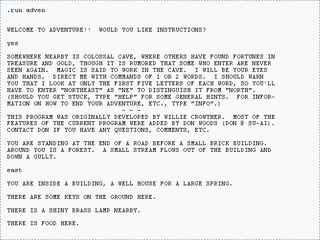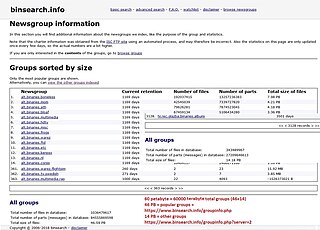Infocom was an American software company based in Cambridge, Massachusetts, that produced numerous works of interactive fiction. They also produced a business application, a relational database called Cornerstone.

Interactive fiction, often abbreviated IF, is software simulating environments in which players use text commands to control characters and influence the environment. Works in this form can be understood as literary narratives, either in the form of interactive narratives or interactive narrations. These works can also be understood as a form of video game, either in the form of an adventure game or role-playing game. In common usage, the term refers to text adventures, a type of adventure game where the entire interface can be "text-only", however, graphic text adventures still fall under the text adventure category if the main way to interact with the game is by typing text. Some users of the term distinguish between interactive fiction, known as "Puzzle-free", that focuses on narrative, and "text adventures" that focus on puzzles.
A Usenet newsgroup is a repository usually within the Usenet system, for messages posted from users in different locations using the Internet. They are discussion groups and are not devoted to publishing news. Newsgroups are technically distinct from, but functionally similar to, discussion forums on the World Wide Web. Newsreader software is used to read the content of newsgroups.
The Z-machine is a virtual machine that was developed by Joel Berez and Marc Blank in 1979 and used by Infocom for its text adventure games. Infocom compiled game code to files containing Z-machine instructions and could therefore port its text adventures to a new platform simply by writing a Z-machine implementation for that platform. With the large number of incompatible home computer systems in use at the time, this was an important advantage over using native code or developing a compiler for each system.

The alt.* hierarchy is a major class of newsgroups in Usenet, containing all newsgroups whose name begins with "alt.", organized hierarchically. The alt.* hierarchy is not confined to newsgroups of any specific subject or type, although in practice more formally organized groups tend not to occur in alt.*. The alt.* hierarchy was created by John Gilmore and Brian Reid.
Inform is a programming language and design system for interactive fiction originally created in 1993 by Graham Nelson. Inform can generate programs designed for the Z-code or Glulx virtual machines. Versions 1 through 5 were released between 1993 and 1996. Around 1996, Nelson rewrote Inform from first principles to create version 6. Over the following decade, version 6 became reasonably stable and a popular language for writing interactive fiction. In 2006, Nelson released Inform 7, a completely new language based on principles of natural language and a new set of tools based around a book-publishing metaphor.
Text Adventure Development System (TADS) is a prototype-based domain-specific programming language and set of standard libraries for creating interactive fiction (IF) games.
Graham A. Nelson is a British mathematician, poet, and the creator of the Inform design system for creating interactive fiction (IF) games. He has authored several IF games, including Curses (1993) and Jigsaw (1995).
Glulx is a 32-bit portable virtual machine intended for writing and playing interactive fiction. It was designed by Andrew Plotkin to relieve some of the restrictions in the venerable Z-machine format. For example, the Z-machine provides native support for 16-bit integers, while Glulx natively supports 32-bit integers.

Phoenix was an IBM mainframe computer at Cambridge University's Computer Laboratory. "Phoenix/MVS" was also the name of the computer's operating system, written in-house by Computer Laboratory members. Its DNS hostname was phx.cam.ac.uk.

Brad Templeton is a Canadian software developer, internet entrepreneur, online community pioneer, publisher of news, comedy, science fiction and e-books, writer, photographer, civil rights advocate, futurist, public speaker, educator and self-driving car consultant. He graduated from the University of Waterloo.

Beginning around 1991, the creator of the television series Babylon 5, J. Michael Straczynski, participated in a number of Internet venues to discuss elements of his work with his fans, including the rec.arts.sf.tv.babylon5 Usenet newsgroup, where he continued to communicate as late as March 2007. This flow of information and feedback had a substantial impact on Babylon 5, as well as Straczynski's other shows and his fan base. This interaction pre-dated the coining of the term "blog", but is functionally similar.
Berkeley Yacc (byacc) is a Unix parser generator designed to be compatible with Yacc. It was originally written by Robert Corbett and released in 1989. Due to its liberal license and because it was faster than the AT&T Yacc, it quickly became the most popular version of Yacc. It has the advantages of being written in ANSI C89 and being public domain software.
Shoujocon was an American fan convention for anime and manga which focused on the shōjo (girls') subgenre. Founded in 2000 by women identified as "Nora" and "Katchan", and initially financed through eBay sales of fan-donated merchandise, Shoujocon quickly grew from 456 attendees to a peak of 1,252. In addition to its unique audience, Shoujocon attempted many other organizational and programmatic innovations during its time, such as an international staff which held meetings entirely online, support for doujinshi artists and writers, and cultural workshops.
James Davis Nicoll is a Canadian freelance game and speculative fiction reviewer, former security guard and role-playing game store owner, and also works as a first reader for the Science Fiction Book Club. As a Usenet personality, Nicoll is known for writing a widely quoted epigram on the English language, as well as for his accounts of suffering a high number of accidents, which he has narrated over the years in Usenet groups like rec.arts.sf.written and rec.arts.sf.fandom. He is now a blogger on Dreamwidth and Facebook, and an occasional columnist on Tor.com. In 2014, he started his website, jamesdavisnicoll.com, dedicated to his book reviews of works old and new; and later added Young People Read Old SFF, where his panel of younger readers read pre-1980 science fiction and fantasy, and Nicoll and his collaborators report on the younger readers' reactions.
Jon Ingold is a British author of interactive fiction and co-founder of inkle, where he co-directed and co-wrote 80 Days, and wrote Heaven's Vault and Overboard!. His interactive fiction has frequently been nominated for XYZZY Awards and has won on multiple occasions, including Best Game, Best Story and Best Setting awards for All Roads in 2001. Ingold's works are notable for their attention to the levels of knowledge that the player and player character have of the in-game situation, with the effect often depending on a player who understands more than the character or vice versa. Ingold has also written a number of plays, short stories and novels.
rec.arts.sf.tv.babylon5.moderated is a moderated Usenet newsgroup that focuses on the science fiction television series Babylon 5 and the works of writer J. Michael Straczynski. It was spun off from its un-moderated version, rec.arts.sf.tv.babylon5, in 1996. The newsgroup counts Straczynski as a frequent contributor, and was among the first internet-based forums where fans interacted directly with a 'showrunner'.
David G. Potter was a computer technician at California State University, Sacramento who was widely known for acerbic, scathingly humorous and knowledgeable postings to Usenet science fiction newsgroups. He assumed the name of Gharlane of Eddore, a character from the Lensman series, as a Usenet pseudonym for Usenet postings and carefully guarded his true identity for many years before his death. He is best known for authoring the Lensman FAQ and voluminous Usenet postings. He died on June 13, 2001 following a heart attack.

Usenet, USENET, or "in full", User's Network, is a worldwide distributed discussion system available on computers. It was developed from the general-purpose Unix-to-Unix Copy (UUCP) dial-up network architecture. Tom Truscott and Jim Ellis conceived the idea in 1979, and it was established in 1980. Users read and post messages to one or more topic categories, known as newsgroups. Usenet resembles a bulletin board system (BBS) in many respects and is the precursor to the Internet forums that have become widely used. Discussions are threaded, as with web forums and BBSes, though posts are stored on the server sequentially.
The Interactive Fiction Technology Foundation (IFTF) is a nonprofit charitable organization founded in June 2016 working to maintain, improve, and preserve tools and services used in the creation and distribution of interactive fiction.